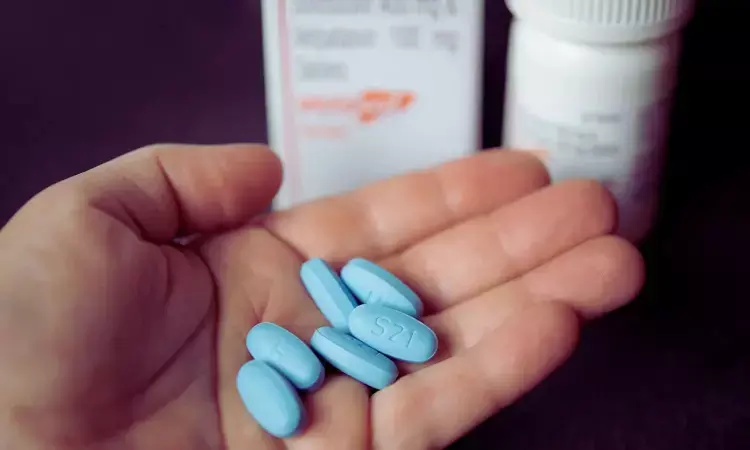- Home
- Medical news & Guidelines
- Anesthesiology
- Cardiology and CTVS
- Critical Care
- Dentistry
- Dermatology
- Diabetes and Endocrinology
- ENT
- Gastroenterology
- Medicine
- Nephrology
- Neurology
- Obstretics-Gynaecology
- Oncology
- Ophthalmology
- Orthopaedics
- Pediatrics-Neonatology
- Psychiatry
- Pulmonology
- Radiology
- Surgery
- Urology
- Laboratory Medicine
- Diet
- Nursing
- Paramedical
- Physiotherapy
- Health news
- Fact Check
- Bone Health Fact Check
- Brain Health Fact Check
- Cancer Related Fact Check
- Child Care Fact Check
- Dental and oral health fact check
- Diabetes and metabolic health fact check
- Diet and Nutrition Fact Check
- Eye and ENT Care Fact Check
- Fitness fact check
- Gut health fact check
- Heart health fact check
- Kidney health fact check
- Medical education fact check
- Men's health fact check
- Respiratory fact check
- Skin and hair care fact check
- Vaccine and Immunization fact check
- Women's health fact check
- AYUSH
- State News
- Andaman and Nicobar Islands
- Andhra Pradesh
- Arunachal Pradesh
- Assam
- Bihar
- Chandigarh
- Chattisgarh
- Dadra and Nagar Haveli
- Daman and Diu
- Delhi
- Goa
- Gujarat
- Haryana
- Himachal Pradesh
- Jammu & Kashmir
- Jharkhand
- Karnataka
- Kerala
- Ladakh
- Lakshadweep
- Madhya Pradesh
- Maharashtra
- Manipur
- Meghalaya
- Mizoram
- Nagaland
- Odisha
- Puducherry
- Punjab
- Rajasthan
- Sikkim
- Tamil Nadu
- Telangana
- Tripura
- Uttar Pradesh
- Uttrakhand
- West Bengal
- Medical Education
- Industry
Hepatocellular Carcinoma After Hepatitis C Cure: Study Emphasizes The Need for Long-Term Surveillance

China: A recent study published in the Annals of Hepatology has emphasized the influence of age on hepatocellular carcinoma (HCC) development following hepatitis C virus (HCV) cure with direct-acting antivirals.
"There were no cases of HCC in patients without cirrhosis and those with low fibrosis (FIB-4 <1.45), whereas older individuals with moderate to advanced fibrosis (FIB-4 ≥3.25) faced a higher risk. Metabolic factors, including BMI and diabetes, did not contribute to HCC development, and recurrences were primarily reported within five years of achieving HCV cure," the researchers reported.
The researchers note that the advent of direct-acting antiviral drugs (DAAs) has revolutionized the treatment of the hepatitis C virus, achieving cure rates exceeding 95%. While this has significantly lowered the incidence of HCC, the risk of liver cancer remains in certain patient groups, particularly those with pre-existing liver damage such as cirrhosis. This has necessitated continued surveillance and risk management strategies to detect and address HCC in patients who have achieved a sustained virological response (SVR).
Against the above background, Lina Cui, Xijing Hospital, Air Force Military Medical University, PR China, and colleagues conducted a systematic review of recent studies exploring the risk factors and mechanisms underlying HCC development after HCV cure, along with the screening strategies, the predictive value of biological markers, and patient surveillance approaches.
According to the authors, several factors, including older age, diabetes, hepatic fat accumulation, alcohol consumption, and the absence of fibrosis reversal, contribute to an increased risk of hepatocellular carcinoma even after achieving a cure for hepatitis C with direct-acting antivirals (DAAs). While the exact mechanisms driving HCC development post-DAA treatment remain uncertain, the researchers suggest potential explanations such as immune cell dysfunction during HCV infection, disruptions in the cytokine network, epigenetic modifications, and host-specific factors.
The study further highlights that various biological markers and risk prediction models have been explored to assess HCC risk in patients with chronic hepatitis C (CHC) who have attained sustained virological response (SVR). However, the authors emphasize that many of these tools still require rigorous validation and standardization before they can be widely implemented in clinical practice. They stress the urgent need for risk-stratified surveillance programs, particularly from a cost-effectiveness standpoint, to ensure timely detection and intervention in high-risk individuals.
"Despite the remarkable success of DAAs in curing HCV, the researchers note that managing CHC patients post-SVR presents an evolving challenge. With an increasing number of individuals achieving viral clearance, refining long-term monitoring strategies and identifying reliable predictive biomarkers for HCC remain critical priorities in optimizing patient outcomes," the researchers concluded.
Reference:
Yang, C., Lv, F., Yang, J., Ding, D., Cui, L., & Han, Y. (2025). Surveillance and management of hepatocellular carcinoma after treatment of hepatitis C with direct-acting antiviral drugs. Annals of Hepatology, 30(2), 101582. https://doi.org/10.1016/j.aohep.2024.101582
Dr Kamal Kant Kohli-MBBS, DTCD- a chest specialist with more than 30 years of practice and a flair for writing clinical articles, Dr Kamal Kant Kohli joined Medical Dialogues as a Chief Editor of Medical News. Besides writing articles, as an editor, he proofreads and verifies all the medical content published on Medical Dialogues including those coming from journals, studies,medical conferences,guidelines etc. Email: drkohli@medicaldialogues.in. Contact no. 011-43720751


